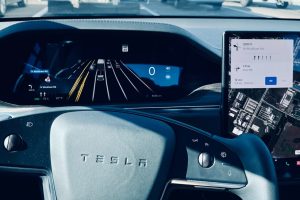- 🚗 Tesla’s Model Y constituted 33.2% of all EVs sold in the U.S. in 2023.
- 🔝 Tesla sold an estimated 394,497 Model Y units, marking a 56.6% YoY increase.
- 📈 Overall, Tesla captured 55.1% of the total EV market, selling 654,888 units.
- 🌐 The Model 3 followed as the second-best seller, with 220,910 units sold in 2023.
- 📊 Tesla’s market share dropped slightly from 65% in 2022 to 55.1% in 2023.
- 🚙 Ford, the closest competitor, had a 6.1% segment share with 72,608 total EV deliveries.
- 📰 The data indicates Tesla’s resilience in a competitive EV market, with the Model Y leading the sales.
In the dynamic world of electric vehicles (EVs), 2023 proved to be a groundbreaking year, and at the forefront of this revolution was Tesla’s Model Y. Let’s delve into the numbers and insights that showcase how Tesla has not only maintained its dominance but also set new benchmarks in the American EV landscape.
Tesla’s Model Y Takes Center Stage
- Market Share Marvel: In a revelation that reverberated through the automotive industry, Tesla’s Model Y accounted for an impressive 33.2% of all EVs sold in the U.S. in 2023.
- Impressive Sales Surge: The numbers tell a compelling story – an estimated 394,497 Model Y units were sold, reflecting a remarkable 56.6% year-over-year increase. The Model Y’s popularity is evidently soaring.
Tesla’s Overall Triumph
- Majestic Market Capture: Tesla’s overall dominance is nothing short of spectacular. With 654,888 units sold, the electric car giant captured a staggering 55.1% of the total EV market.
- Model 3: A Formidable Contender: While the Model Y stole the show, Tesla’s Model 3 wasn’t far behind. As the second-best seller, it clocked in at 220,910 units, solidifying Tesla’s dual supremacy in the EV realm.
- A Dip in Market Share: The statistics indicate a nuanced narrative. Tesla’s market share slightly declined from 65% in 2022 to 55.1% in 2023. While a drop, it’s essential to recognize this against the backdrop of a rapidly evolving and increasingly competitive market.
The Challenger: Ford in the Rearview
- Ford’s Strive for Relevance: As the closest competitor, Ford made strides with a 6.1% segment share, accounting for 72,608 total EV deliveries. Noteworthy, but it underscores the chasm that still exists between Tesla and its competitors.
Insights and Reflections
- Resilience Amidst Change: Tesla’s ability to maintain over half of the EV market share signifies its resilience in the face of evolving consumer preferences, emerging competitors, and the rapid evolution of EV technology.
- Model Y: A Game-Changer: The Model Y’s surge in sales exemplifies the shifting consumer interest towards versatile electric SUVs. Its success also underscores Tesla’s strategic product positioning.
- Strategic Market Moves: The launch of Tesla’s upgraded Model 3 in North America, coupled with an overall market share increase, portrays the company’s strategic acumen in understanding and responding to market dynamics.
Conclusion
In conclusion, Tesla’s Model Y emerged as the undeniable star of the U.S. EV market in 2023, propelling the company to new heights. As the electric vehicle landscape continues to evolve, Tesla’s prowess and adaptability remain key factors in maintaining its leadership position.





